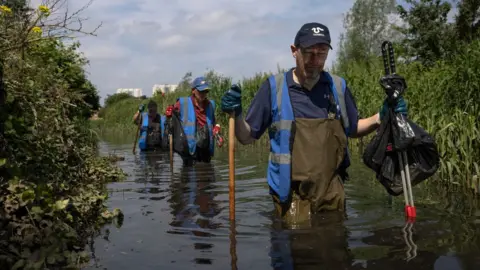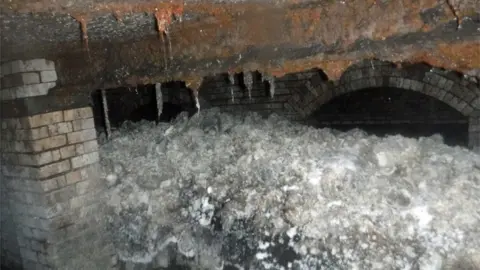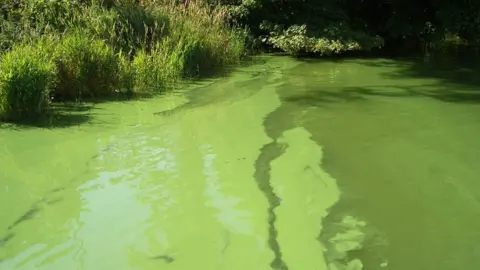'Chemical cocktail’ polluting English rivers - MPs warn
 Getty Images
Getty ImagesRaw sewage, microplastics and slurry are coursing through all of England's rivers, putting health and nature at risk, a parliamentary report concludes.
Agriculture and water companies are the biggest contributors to this "chemical cocktail", the Environmental Audit Committee warns.
Car tyre particles, oils and wet wipes are also clogging waterways.
The environment minister said the report highlighted areas the government was currently tackling.
People across the country using rivers for activities ranging from sports and swimming to fishing risk falling ill from bacteria in sewage and slurry.
The water and riverbanks are also home to rich plant, fish and insect life and are essential to biodiversity. But chemicals, plastics and an excess of nutrients are choking the water.
No river in England can be given a clean bill of health, the group of MPs on the committee concluded after months of hearing from experts.
Budget cuts are hampering the Environment Agency's ability to stop pollution, says the report.
"Rivers are the arteries of nature and must be protected. Our inquiry has uncovered multiple failures in the monitoring, governance and enforcement on water quality," Environmental Audit Committee chairman and MP Philip Dunne said.
"For too long, the government, regulators and the water industry have allowed a Victorian sewerage system to buckle under increasing pressure."
Environment Minister Rebecca Pow said: "We are going further and faster than any other government to protect and enhance the health of our rivers and seas.
"We welcome the Environmental Audit Committee's report which highlights many areas that this government is now tackling."

What happens next?

What a damning finding: every single river in England is contaminated with a cocktail of chemicals, according to the Environmental Audit Committee (EAC).
No surprise then that the committee's report is so critical of virtually everyone involved in managing the country's rivers.
But don't assume that will prompt a sudden flurry of parliamentary or regulatory activity.
The EAC has an unusually wide remit for a select committee. It can summon witnesses and request government papers to investigate environmental protection and sustainable development across all government departments.
What it can't do is force the government to act on its reports or push its recommendations through Parliament.
The committee's main power is to draw attention to any failures or shortcomings. So the hope will be this report shames the government and its regulatory agencies into raising their game on river pollution.
What it can't guarantee is that your local river will actually be cleaned up any time soon.

The report makes a series of recommendations to overhaul how the country's rivers are managed. Water companies should be penalised more heavily for sewage discharge and each river should have a designated bathing area by 2025, it suggests.
Pollution from intensive farming, in particular from chicken farms, is the most common way rivers are being contaminated, the report says.
Excess nutrients such as phosphorus and nitrogen leaked into water cause algae to bloom to high levels in water - that's the cause of the thick, bright green layer often seen coating waterways.
This can prevent oxygen entering the water, suffocating life beneath the surface.
Oils and fats poured down sinks in homes and restaurants is adding to the huge numbers of hygiene items like wet wipes that make their way into waterways.
"Fatbergs" as big as blue whales have been removed from sewers in cities across England, costing companies and customers around £100 million a year, the report noted.
 South West Water
South West WaterThe committee is calling on the government to ban single use cleaning and hygiene products containing plastics.
It also said that poor governance, monitoring and chronic underinvestment in the Environment Agency were a major contributor to the poor state of rivers.
The reports singles out Wales and south-west Midlands where the waste from 20 million chickens may be raising the River Wye's phosphorus levels.
The committee recommends that new poultry farms should not be permitted in areas where rivers have excess levels of nutrients.
Andrew Rumming, a beef farmer at Waterhays farm in Wiltshire, said that it's bad socially, economically and environmentally for agriculture to pollute water courses, calling it "unacceptable". He said high demand for cheap chicken was partly to blame.
"It's vital that future farming schemes enable farmers to invest in new technology and infrastructure to tackle potential pollution issues," the National Farmers Union (NFU) said.
The report says water companies are second only to agriculture in polluting rivers.
They regularly discharge raw sewage into rivers and fail to disclose overflows, it says.
 Centre for Ecology & Hydrology
Centre for Ecology & Hydrology Dumping sewage into rivers is only allowed in exceptional circumstances. Visual evidence of these spills include faeces, tampons and toilet rolls floating on water surfaces or caught in plants.
The committee highlighted that community groups often report sewage overflow incidents that are not disclosed by water companies to the Environment Agency - suggesting the problem is much more widespread.
The report says that how companies self-monitor must be urgently reviewed.
A Water UK spokesperson commented: "We support the committee's urgent call for action to improve the health of England's rivers.
"Many of the recommendations mirror proposals set out in our recent 21st Century Rivers report, which calls for government, regulators, water companies, agriculture, and other sectors to come together and create a comprehensive national plan to transform our rivers."
How we behave at home and outside also plays a role.
Microplastics worn away from car tyres and brakes are being washed from busy roads into rivers - the committee said National Highways and the Environment Agency are not doing enough to prevent this pollution.
Environmental issues are devolved but a UK-wide survey of river quality has been recommended by the Environmental Audit Committee because the same problems are likely to be occurring in Scotland and Wales.
